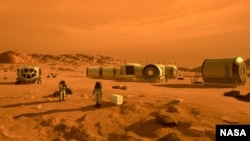American researchers suggest in a new study that humans will need to create very Earth-like conditions to survive for long periods in space.
The study comes as the American space agency NASA prepares to return astronauts to the moon with its Artemis program. NASA recently announced its next crew of astronauts who will take part in a test mission to fly around the moon. In the more distant future, NASA plans to launch missions to Mars.
The study was recently published in Frontiers in Astronomy and Space Sciences. It describes conditions that would likely be needed to support long-term human life in space or on other planets. The study was carried out by a team from Cornell University in New York state and the Norfolk Institute in Virginia.
The study centered on issues such as dealing with gravity and oxygen in space, collecting water, developing agriculture and getting rid of waste in space.
One of the researchers was Morgan Irons, a doctoral student at Cornell. She cooperated with other scientists to explore important physical needs humans would require during future space travel.
She said in a statement that life in space would require a “natural ecosystem” to support humans and their necessary equipment. “Without these kinds of systems, the mission fails,” Irons added.
Another co-writer of the study was Lee Irons. He is Morgan’s father and heads the Norfolk Institute, a group that seeks to “work toward the resiliency” of humans on Earth and in space.
Lee Irons said one of the biggest problems for humans in space will be issues related to gravity. Humans experience lower levels of gravity in space. He noted that a lack of gravity can change the fluid pressure in living things. This can lead to health problems for humans living in space.
“An example of gravity imbalance would be the negative effect on the eyesight of humans in Earth orbit,” Lee Irons said. This would be a problem in space because an individual would not have the weight necessary to keep the same fluid pressure the body was used to on Earth.
The researchers said they first had to study the long-term physical needs of humans – both on Earth and in space. They are proposing that space mission planners seek to find ways “to recreate the same evolutionary, ecological, networks that make Earth successful.”
Morgan Irons said billions of dollars could be wasted on setting up a space settlement only to see it fail. “Because even with all other systems in place, you need gravity.”
She added, “There is just no other place in space where there is 1G of gravity; that just doesn’t exist anywhere else in our solar system. That’s one of the first problems we must solve.” 1g is another term for what scientists call “normal gravity,” or the gravity that exists on the Earth’s surface. It can be measured as the rate of speed at which an object travels when falling to the ground, NASA explains.
The team says oxygen is another important consideration. The researchers say space agencies would need to build high-technology main and backup oxygen systems to support long-term human life in space. But what if they fail?
One suggestion from the study is to deploy living things to produce oxygen. “Think of the hundreds of thousands of species of plants that make oxygen," Lee Irons said. He added that that kind of system would be needed to support long-term missions in space and on planets.
The other main requirement would be a huge amount of energy from the sun, the study suggests. The researchers noted that as astronauts travel farther from the sun, they will be able to collect less and less solar energy.
“You’ll need a lot of energy,” Lee Irons said. “Otherwise powering the ecological system of an outpost will be like trying to run your car on a cell phone battery.”
I’m Bryan Lynn.
Bryan Lynn wrote this story for VOA Learning English, based on reports from Cornell University and Frontiers in Astronomy and Space Sciences.
________________________________________________________________
Words in This Story
mission – n. a flight by an aircraft or spacecraft to perform a specific task
resiliency –n. the ability to become healthy and strong after a setback or something bad happens
negative – n. not expecting good outcomes
evolution – n. the theory that changes in plants and animals happen because of natural processes over long periods of time
species – n. a group of animals or plants that are similar and can produce young animals or plants
outpost – n. a small place that is far from large towns or cities, often where a government or company is represented
___________________________________________________________________
What do you think of this story? We want to hear from you. We have a new comment system. Here is how it works:
- Write your comment in the box.
- Under the box, you can see four images for social media accounts. They are for Disqus, Facebook, Twitter and Google.
- Click on one image and a box appears. Enter the login for your social media account. Or you may create one on the Disqus system. It is the blue circle with “D” on it. It is free.
Each time you return to comment on the Learning English site, you can use your account and see your comments and replies to them. Our comment policy is here.







Forum